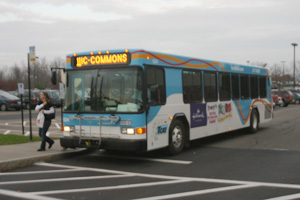In an effort to create a more sustainable public transportation system, the Tompkins Consolidated Area Transit purchased six new hybrid buses this year.

The first three buses will arrive in January and will be put into use immediately.
The TCAT purchased the diesel-electric hybrids from the GILLIG Corporation in California.
Hybrid buses are powered by a combination of a gasoline internal combustion engine and a battery-powered electric engine. They reduce emissions, save on fuel, and drive more smoothly and quietly than conventional buses.
The buses will have a 25 percent better fuel efficiency rate than the diesel buses TCAT uses now, which get approximately 3.9 miles per gallon.
The current fleet is made up of 36 full-size buses. With the six hybrids on the road, more than 9,000 gallons of fuel and $26,000 in fuel costs will be saved each year.
Wendy Skinner, the marketing and communications manager for TCAT, said the new vehicles will be more clean and efficient.
“They look very much like a regular bus but feel much different when you sit inside,” she said. “It’s eerily quiet.”
The hybrids cost about $450,000, approximately $100,000 more than diesel buses.
Though the $100,000 increase in price may seem high, Skinner said the TCAT company is putting the extra money into the buses because it’s socially responsible.
“Green and renewable energy — it’s not always about economy,” she said. “We got the funding because politicians and funders believe in it … It’s not overly luxurious. It’s the right thing to do.”
Tim Joseph, chair of the Tompkins County Legislature, said most costs were alleviated by state grant money. The buses were purchased with a $1.2 million capital grant from New York’s State Transit Dedicated Fund that TCAT received in June and a more recent $500,000 federal grant.
At least 40 cities and areas in the U.S. are using diesel-electric hybrid buses, including New York City; Washington, D.C.; Hartford, Conn.; Lansing, Mich.: Tulsa, Okla.; Orange County, Calif.; Seattle, Wash.; and Yosemite National Park, Calif.
Joseph said the high price tag of the buses should not be a deterrent for other communities.
“They are more expensive initially but significantly reduce fuel usage along with emissions,” he said.
TCAT does not have plans to convert the whole fleet to hybrids partly due to fluctuations in government funding and partly because better technologies may emerge. They want to test the hybrids’ performance on Ithaca’s hilly terrain and understand more about their maintenance records before committing to this technology.
In addition, TCAT will soon be using an ultra-low-sulfur diesel fuel that is being phased in nationally starting this fall. Sulfur dioxide from burning fuel is a primary cause of acid rain.
“This cleaner fuel, coupled with new regulations regarding the construction of diesel engines, is predicted to reduce nitrogen oxide emissions by 50 percent for all conventional buses purchased in 2007 and beyond,” Skinner said.
In 2007, TCAT will begin adding particulate filters to its existing buses to reduce particulate products of combustion, such as soot, from the exhaust.
The company has also considered the use of biodiesel, a fuel derived from vegetable oil.
Jason Hamilton, an assistant professor of biology, who rides the bus to campus every day, does not understand why people would not want to take the TCAT.
“In general, I like riding the bus … I can get some exercise by choosing to get off further away or closer to my destination, and I can chat and get work done while waiting,” he said.
Susan Allen-Gil, an associate professor of biology, said though she is thrilled that TCAT will be obtaining new hybrid buses, without an increase in ridership, the hybrid buses will have little effect on the bus fleet’s fuel usage.
“An entire bus, even if it is hybrid, is still using a lot of fuel whether there are 20 or two people riding,” she said. “If people choose to ride the TCAT rather than drive, the hybrids will make a large difference.”







